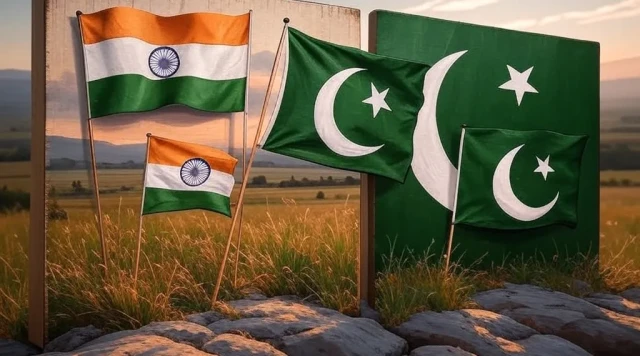India and Pakistan exchanged accusations of violating a ceasefire early Sunday, just hours after US President Donald Trump declared that the nuclear-armed neighbors had backed away from an imminent full-scale war.
India’s foreign secretary stated that the country retaliated due to Pakistan’s repeated breaches of the truce, while Pakistan asserted its commitment to the ceasefire, claiming its forces addressed Indian violations with caution and responsibility.
AFP reporters in Srinagar, located in Indian-administered Kashmir, reported loud explosions, and a senior official in Pakistani-administered Kashmir noted that “intermittent fire exchanges are ongoing” across the disputed Line of Control (LoC). Further details were sparse, and independent verification of the claims was not possible.
On Saturday, Pakistan and India had reached an agreement for a comprehensive and immediate ceasefire following days of intense aerial and artillery attacks that resulted in at least 60 fatalities and caused thousands to flee their homes along the border and within divided Kashmir.
The news was unexpectedly shared by Trump on Saturday.
He announced on social media, “After a long night of talks mediated by the United States, I am happy to report that India and Pakistan have agreed to a FULL AND IMMEDIATE CEASEFIRE. Congratulations to both countries for exercising common sense and great intelligence.”
Later that evening, Trump made another post on Truth Social, commending the leaders of India and Pakistan for recognizing that “it was time to halt the current aggression” and promising to significantly increase trade with both countries.
The US president further stated he would collaborate with New Delhi and Islamabad to explore a long-term resolution regarding Kashmir.
India's foreign secretary Vikram Misri mentioned earlier that both nations would “cease all military actions on land, air, and sea” starting at 5:00 pm (1130 GMT).
He accused Pakistan of repeated violations, asserting that Indian armed forces were providing an adequate response.
Meanwhile, Pakistan’s foreign ministry maintained that it was committed to faithfully implementing the ceasefire.
They acknowledged violations by India but stated their forces were managing the situation with responsibility and caution.
The conflict was ignited by an attack last month in Indian-administered Kashmir that resulted in 26 deaths, mainly among Hindu tourists, which New Delhi attributed to Islamabad.
India accused the Pakistan-based militant group Lashkar-e-Taiba, recognized as a terrorist organization by the UN, of the assault; however, Islamabad denied any involvement and demanded an independent investigation.
Former Indian foreign secretary Harsh Vardhan Shringla commented on Sunday that the ceasefire “seems to be a temporary situation,” suggesting that the Americans had influenced Pakistan’s actions, and described India’s “Operation Sindoor” as a significant success in targeting terrorists.
Militant activities in Kashmir have intensified since 2019, when Prime Minister Narendra Modi’s Hindu nationalist government revoked the region's limited autonomy and took direct control from New Delhi.
The two countries have engaged in several wars over the territory, which both claim in full but manage separate sections since their independence from British rule in 1947.
Bilal Shabbir, an IT consultant in Muzaffarabad in Pakistani-administered Kashmir, described the ceasefire as a positive development, stating, “In war, it’s not just soldiers who die, it’s mostly civilians and in this case, it would have been the people of Kashmir.”
In Srinagar, resident Sukesh Khajuria expressed cautious optimism, saying, “The ceasefire is welcome, but it’s hard to trust Pakistan. We must be vigilant.”
US Secretary of State Marco Rubio noted that the ceasefire was reached after he and Vice President JD Vance interacted with high-ranking officials from both nations, with Rubio stating on X that they had agreed to initiate discussions on various issues at a neutral location.
Pakistani Prime Minister Shehbaz Sharif took to X to express his country’s appreciation for the US’s involvement, which has historically sought international mediation regarding Kashmir, despite India’s consistent opposition to such interventions.
Analysts expressed skepticism about the ceasefire. Michael Kugelman, a South Asia expert based in the US, wrote on X that “the ceasefire was hastily put together at a time of heightened tensions.”
He noted that India appeared to interpret the agreement differently than the US and Pakistan and was likely not interested in the broader discussions that it had advocated.
He warned that upholding the ceasefire would present challenges. The news of the ceasefire brought relief to many nations, including the UK and Iran, as well as the United Nations.
China, which shares borders with both India and Pakistan, indicated through state-run news agency Xinhua its willingness to play a constructive role and expressed concerns regarding any potential escalation.




















